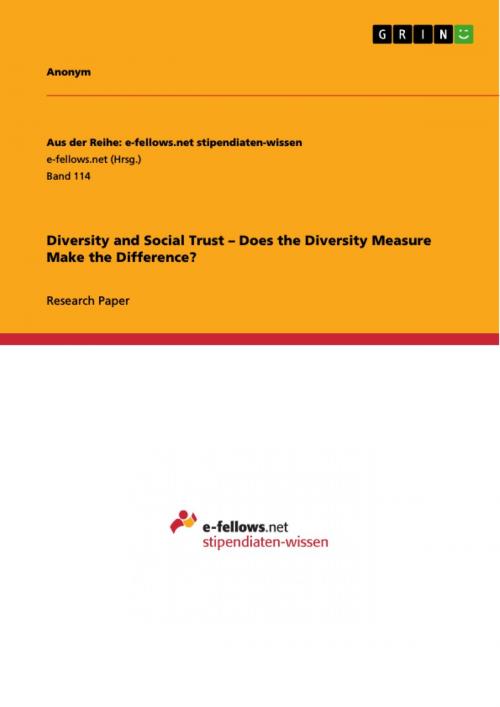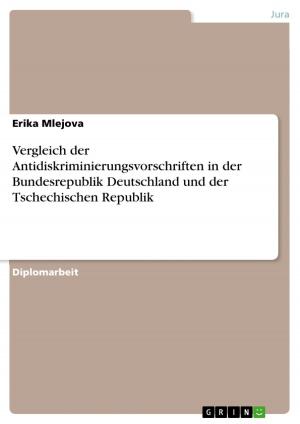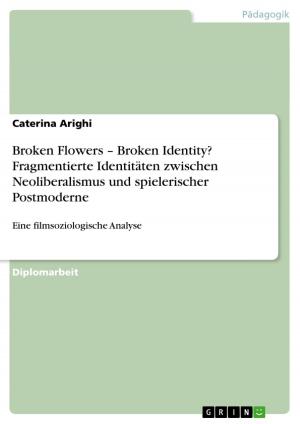Diversity and Social Trust - Does the Diversity Measure Make the Difference?
Nonfiction, Social & Cultural Studies, Social Science, Cultural Studies, Ethnic Studies| Author: | Anonymous | ISBN: | 9783640962242 |
| Publisher: | GRIN Verlag | Publication: | July 19, 2011 |
| Imprint: | GRIN Verlag | Language: | English |
| Author: | Anonymous |
| ISBN: | 9783640962242 |
| Publisher: | GRIN Verlag |
| Publication: | July 19, 2011 |
| Imprint: | GRIN Verlag |
| Language: | English |
Research Paper (postgraduate) from the year 2008 in the subject Cultural Studies - Basics and Definitions, grade: 1,33, Jacobs University Bremen gGmbH, language: English, abstract: Over the last decades, the rise of Social Capital as a central field of research in Social Science has contributed to an increasingly controversial and in-depth debate about trust. In particular, the identification of valid predictors for trust has been widely discussed, entailing various theories and outcomes. In the context of this course, this paper focuses on one specific predictor for trust, which has been generally accepted, namely the degree of diversity. Many scholars have applied this relationship of diversity and trust, yet by using very diverse definitions of what they understand by diversity. This paper seeks at filling this gap of lacking conceptual clarification in terms of measuring diversity. We aim at answering the question whether or not the diversity measure has a significant impact on trust as the dependent measurement variable, and if so, which diversity variable matters most. For this research, we combine three papers related to the research question. Alesina et al. (2003) have presented a more comprehensive overview of diversity by introducing three different measures (ethnic, linguistic, and religious). Secondly, Fearon (2003) contributed to the topic through the refinement of the ethnic diversity measures, and the development of two indicators, ethnic and cultural fractionalization. Furthermore, he divided his large sample of countries into six world regions, a typology which we will also use in our study in order to identify possible peculiarities according to a certain region. We will combine the three measures by Alesina et al. (2003) and the two by Fearon (2003) and correlate those five independent variables with the dependent variable 'trust' on a country level, whose scores are taken from Bjørnskov (2008). The stronger the correlation, the more relevant we interpret the respective independent variable for trust. Moreover, we introduce viable controlling variables in order to eliminate external influences. After the already described screening for regional specialties, we finally execute a linear regression which would further explore the relationships between our variables of interest. We will argue on the basis of our findings that the diversity measure matters, in particular that ethnic fractionalization has the strongest impact on generalized social trust.
Research Paper (postgraduate) from the year 2008 in the subject Cultural Studies - Basics and Definitions, grade: 1,33, Jacobs University Bremen gGmbH, language: English, abstract: Over the last decades, the rise of Social Capital as a central field of research in Social Science has contributed to an increasingly controversial and in-depth debate about trust. In particular, the identification of valid predictors for trust has been widely discussed, entailing various theories and outcomes. In the context of this course, this paper focuses on one specific predictor for trust, which has been generally accepted, namely the degree of diversity. Many scholars have applied this relationship of diversity and trust, yet by using very diverse definitions of what they understand by diversity. This paper seeks at filling this gap of lacking conceptual clarification in terms of measuring diversity. We aim at answering the question whether or not the diversity measure has a significant impact on trust as the dependent measurement variable, and if so, which diversity variable matters most. For this research, we combine three papers related to the research question. Alesina et al. (2003) have presented a more comprehensive overview of diversity by introducing three different measures (ethnic, linguistic, and religious). Secondly, Fearon (2003) contributed to the topic through the refinement of the ethnic diversity measures, and the development of two indicators, ethnic and cultural fractionalization. Furthermore, he divided his large sample of countries into six world regions, a typology which we will also use in our study in order to identify possible peculiarities according to a certain region. We will combine the three measures by Alesina et al. (2003) and the two by Fearon (2003) and correlate those five independent variables with the dependent variable 'trust' on a country level, whose scores are taken from Bjørnskov (2008). The stronger the correlation, the more relevant we interpret the respective independent variable for trust. Moreover, we introduce viable controlling variables in order to eliminate external influences. After the already described screening for regional specialties, we finally execute a linear regression which would further explore the relationships between our variables of interest. We will argue on the basis of our findings that the diversity measure matters, in particular that ethnic fractionalization has the strongest impact on generalized social trust.















